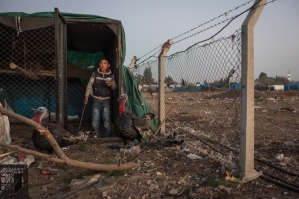Amid a growing need for food, clothing, and warmth, Syrian refugees living in Turkey are considering selling their organs to earn money to feed their children, a ministry director has revealed.
There are over 2.7 million Syrian refugees who fled the country's civil war currently living in crowded camps across Turkey, and with few provisions to go around, parents are forced to go to extreme measures, according to Christian Aid Mission.
"The situation is so bad that some parents we talk with even think about selling organs just to meet needs for their family and children," a ministry director working in a refugee camp told the outlet. "Around 140 babies need baby formula and diapers immediately; also, refugees need food boxes immediately."
In one camp alone, ministry workers found 40 newborns and 140 other babies in immediate need of baby formula and diapers. Families in 400 tents needed firewood, heaters were needed in another 170 tents, and the ministry also seeks 300 blankets for refugees as winter temperatures set in.
"We need immediately at least 170 heaters to keep newborn babies and children warming up from the cold," he said. "Nothing nutritious comes from their hands, and they do not know where to go. They do not know how to get through the winter, they have no warming materials."
While Syrians are eligible for free medical care, they can only access such services in the district where they are registered, according to IRIN News. However, refugees have flooded thousands of unofficial camps in southern Turkey because security forces in the official camps abuse them, the ministry director revealed.
"The camp is hosting more and more people escaping from war every day - with each passing day, nobody wants to live in official camps because they are subject to ill-treatment by the security forces there in the official camps," the director said. "People have been become sick, but the camp has never been helped, even though they have been telling municipal officials many times."
The ministry reportedly recently visited 2,350 of the 10,000 tents in the area, as well as 220 homes, and provided Bibles, flour, oil, tomato sauce, milk and other basic food items, along with clean water.
Earlier, a ministry shared how, after experiencing atrocities at the hands of Islamic extremists and the dismissive attitude of Turkey's government, many of the refugees have begun asking about Jesus and Christianity.
The ministry director recalled, "We were telling them the difference between Islam and Christianity, and when they heard the difference, they said, 'We didn't know the way of Christianity that you are telling us about.' We are so glad that the Lord is using all of us to reach them, to correct their way and to redirect them. Please pray for us so we can reach more people, and we are also praying for you all so we can assist them in their suffering lives."

Despite their bleak situation, many children remain hopeful, expressing a desire to learn Turkish, read, and become teachers or doctors. However, many of them are unable to attend school: "Most of the families are working in fields, so they can't send their children to school," the director said. "The older children have to look after the younger ones, and if a rich Turkish man comes looking for a wife, young girls are given to him."
Because of the overwhelming needs in the refugee camps, any aid is greatly appreciated - no matter how small.
"They have more needs than ever," he said. "These people are really in misery and losing their beliefs, and in this case we have really big duties. We can win people who are in this sociological and spiritual depression, as long as God is with us. And we can never accomplish this task without you."
To learn how you can help, visit the Christian Aid Mission website.







